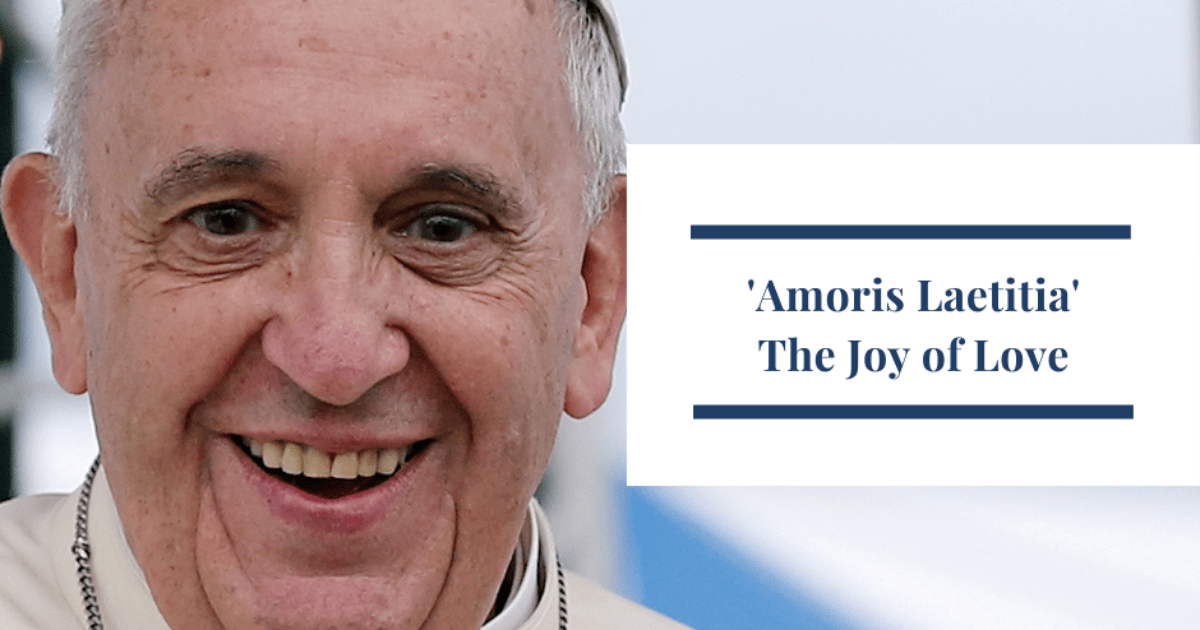Amoris Laetitia – Reflection on Chapter Two
18 November, 2021
The Experiences and Challenges of Families

After reading the second chapter of Amoris Laetitia (The Joy of Love), four main points came to mind. The first point is that our Church has a beautiful and rich history. We are the Body of Jesus Christ guided by the Holy Spirit. Our Catholic traditions are based on the life of Jesus, passed down from the Church Fathers. The second point is that each human family is unique, with its own challenges and backgrounds, making us who we are as individuals. The third point is that human weakness leads to sin and hurt, but even in our weakness we can be gifted with super-natural strength through God’s grace. And, the final thought is the question: Who does God call us to be? Especially, in regard to family relationships – sons, daughters, brothers, sisters, fathers, grandfathers and grandmothers.
When we allow God to be in every part of our life, He responds by guiding us, feeding and challenging us so that we can become holy. Pope Francis addresses many aspects of family life in various parts of the world. He writes about single parents, families in war torn countries and those complicated family relationships. There are a large number of our brothers and sisters in Jesus, that are persecuted for their faith. They live in poverty and go hungry every day. Interestingly, persecution often leads to a growth in the virtue of faith. When we are challenged as Christians, Jesus calls us to rise and unite our sufferings with His. It is through this redemptive suffering that we are united as God’s family.
In recent times, the laws and regulations that guide our society have been drastically changed especially in the protection of the greatest gift from God – life. Pope Francis writes about the issue of ‘extreme individualism’ which is based on selfishness and arrogance, where individuals are seeking their own pleasure rather than being concerned with the needs of their family members. He points out that our declining populations are a cause for concern as children can be seen as a burden or an inconvenience. He also stated that “euthanasia and assisted suicide are serious threats to families worldwide” (p.44). While it is important to point out the things that are a cause for concern in our world, it is wise to then turn our attention to how to deal with some of these problems. One of my favourite comments from this chapter is: “What we need is a more responsible and generous effort to present the reasons and motivations for choosing marriage and family, and in this way to help men and women better to respond to the grace that God offers them.” (p.31)
As an immigrant, I have personal experiences that have led to my own faith becoming stronger. I have been blessed in my life by having excellent parents and close family connections with my siblings. In my vocation as a wife and a mother to four sons, I have tried to lean on the ideals that the Church has for family and married life. I am so grateful that the bar has been set high for every vocation within the Church. Jesus instituted each Sacrament for us so that we can become the best version of ourselves, so we can reach our heavenly home. He gives us opportunities to become holy, no matter where we are in our life journey. When somebody asks me who I am and what I do, I am happy to answer that I am a beloved daughter of the most Merciful God, working on becoming who He intended me to be from the beginning of time.
St Joseph, Pray for us!
St Mary MacKillop, Pray for us!
Jana Mackie, Bundaberg

